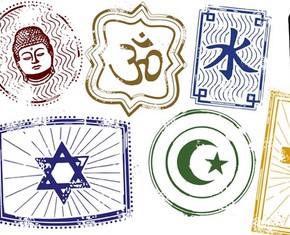The views expressed in our content reflect individual perspectives and do not represent the authoritative views of the Baha'i Faith.
Do all religions need rules?
In Buddhism, believers strive to walk the Noble Eightfold Path, a way for human beings to achieve wisdom, concentration and ethical conduct. Buddha explained that ethical conduct includes right speech, right livelihood and right action. With the gift of his teachings, Buddha endeavored to help his followers live their lives in ways that would lead to their happiness – and the happiness of society as a whole. Every great Faith has similar recommendations, rules and laws of conduct — a moral code that advises us how to live.
Our actions – the things we do in our daily lives – have an enormous impact on our own spiritual development, our happiness and our future. If we want our actions to have a positive impact, not just on ourselves but on those around us, it will help us to understand what the moral codes of religion have to teach us.
The Baha’i teachings say that the second pillar of religion is obeying God’s law – putting the central idea of Buddha’s right action to work in our real, day-to-day lives. Baha’is see these laws, not as an imposition of Divine will, or of power, or pleasure, but as the resolutions of truth, reason and justice in the human world.
From a Baha’i perspective, religions typically contain two types of rules: one type deals with essential, eternal principles common to all Faiths, while the other type is bound by the contingencies of time and place:
…the change and modification of conditions, and the altered requirements of different centuries and times, are the cause of the abrogation of laws. For a time comes when these laws are no longer suitably adapted to conditions. Consider how very different are the requirements of the first centuries, of the Middle Ages, and of modern times. Is it possible that the laws of the first centuries could be enforced at present? It is evident that it would be impossible and impracticable. In the same manner, after the lapse of a few centuries, the requirements of the present time will not be the same as those of the future, and certainly there will be change and alteration. In Europe the laws are unceasingly altered and modified; in bygone years, how many laws existed in the organizations and systems of Europe, which are now abrogated! These changes and alterations are due to the variation and mutation of thought, conditions and customs. If it were not so, the prosperity of the world of humanity would be wrecked. – Abdu’l-Baha, Some Answered Questions, pp. 95-96.

Symbol of Buddhism and Eightfold path to enlightenment
So laws can come and go – except the everlasting spiritual laws of the universe. We can all fairly easily determine the eternal rules we need to follow – every Faith has emphasized them. We must not only love God, but love our neighbor (Matthew 22:39). We need both personal faith and caring deeds. Meditation or prayer alone will not work. Right understanding, purpose, alertness, and concentration – that inner half of the Buddha’s eightfold path — are all necessary. But the other, outer half of the eightfold path — right speech, conduct, effort, and vocation — are also required; because they comprise the deeds that prove and carry out the inner intention.
Each of the great religions contains a Golden Rule that helps summarize the essence of these eternal rules. In Islam it is expressed:
A good deed and an evil deed are not alike: repay [evil] with something that is finer, and see how someone who is separated from you by enmity will become a bosom friend. The Qur’an, 41:34.
In Hinduism, we find it in many places, as expressed in the Mahabharata as: “Treat others as thou wouldst thyself be treated” (Santi parva 167:9 In The Spiritual Heritage of India , Swami Prabhavananda, p. 92). In Judaism, we read, “Thou shalt not avenge, nor bear any grudge against the children of thy people, but thou shalt love thy neighbor as thyself.” (Leviticus 19:18. C.f. Ecclesiasticus 31:15.) In Christianity we find: “All things whatever ye would that men should do to you, do ye even so to them.” (Matthew 7:12) And Buddhist scripture reveals: “Overcome anger by love; overcome evil by good; overcome greed by generosity; and the lie by truth!” (From the Pali Texts, quoted in The Peace Bible, p. 32)
These simple, penetrating and powerful creeds help us remember that the spiritual person focuses on both of the pillars of religion — the love of God and right action. Salvation stands on two pillars. But is this all to salvation? What about the other laws? And if there are so many different laws between religions, some of them seemingly contradictory, which laws do we strive to follow? We’ll turn to this consideration in our next article.
















Comments
Sign in or create an account
Continue with Googleor